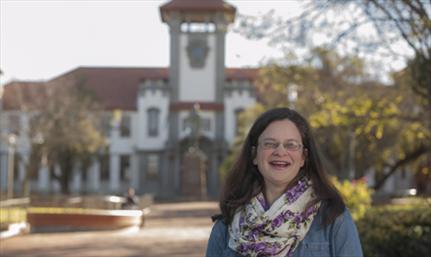|
 |
Dr Gryzenhout
Photo: Sonia Small
03 July 2013 |
“The award serves to prove that my type of research is truly relevant.” These are the words of Dr Marieka Gryzenhout of the Department of Plant Sciences at the UFS, who received the T W Kambule NRF-NSTF Award as emerging researcher in June 2013.
The award from the National Research Foundation (NRF) and the National Science and Technology Forum (NSTF) gives recognition to her outstanding contribution to science, engineering, technology and innovation (SETI) in the country.
Dr Gryzenhout is also part of the Vice-Chancellor’s Prestige Scholar Programme.
“It was an honour to be chosen as a finalist, but to even win it? Die award indicates the importance of fungi and plant pathogens, and their presence in various biological systems and that it is important to identify and categorise significant plant pathogens and fungi to enable easier access for users of these names.”
Dr Gryzenhout was in the US on the evening of the awards ceremony, attending a workshop on the identification and research of another fungus group, Fusarium. “This group is extremely important, since it includes important plant pathogens, producers of toxins in food and feed, as well as animal and human pathogens, and it also plays important ecological roles.”
She attended the Kansas State University in Kansas and paid a visit to the Bacterial Foodborne Pathogens and Mycology Unit of the US Department of Agriculture in Illinois.
Dr Gryzenhout is also a finalist in the Women in Science Awards hosted by the Department of Science and Technology. The winner will be announced in August 2013. Prof Maryke Labuschagne and Rose Lekhooa are also nominees.